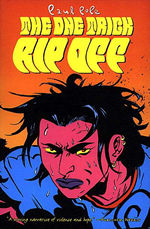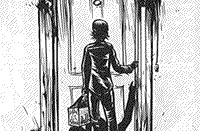>> Comment: Appointments With Disappointment
>> Comment: Accentuate The Positive?
More...

 Writer/Artist: Paul Pope
Writer/Artist: Paul Pope
Letterer: Michael Neno
Collecting stories from DARK HORSE PRESENTS #101-112
Price: $12.95
Publisher: Dark Horse
ISBN: 1-56971-244-1
Much of Paul Pope's work smells like teen spirit. It shivers with nervous sexual energy, the threat being that it is likely to prematurely climax at any moment. Everything from the where-they-fall sketch of his inks to the recurring young-at-heart archetypes courses with this uninhibited dynamism. If you were to remove the vacant ephemera and corporate sponsorship from MTV and boil it down to its core - the infinitely self-propagating joie de vivre of life on the cusp of adulthood - you would be cooking on the same gas as Paul Pope.
THE ONE TRICK RIP-OFF was originally serialised in the ongoing anthology series DARK HORSE PRESENTS. Despite lasting for far longer than it had any right to, DHP eventually fell foul of the current droop in readership. Anthologies have always been a tough-sell to readers; no recurring characters, no recurring creators, no guarantee of anything. In the current sad travails of comics to their untimely death, the long-term readers need a guide-rail of familiarity to cling to, however staid or unimpressive. Anthologies succeed by building a name, like HEAVY METAL and 2000AD, and while DHP produced some enthralling stories, it failed to leave an indelible mark.
While the serialisation process is noticeable during the early portion of ONE TRICK RIP-OFF, it quickly becomes an invisible delineation. Toward the end, the pages turn so effortlessly and the story segues so smoothly from chapter to chapter that you'd be hard pushed to guess its heritage if you didn't already know. Indeed, it's hard to imagine there being a month or two between chapters during the do-or-die climax. The eagle-eyed will spot where the biggest gap in serialisation occurred, as the book moves from a more traditionally American style to take on an Eastern influence in the later chapters.
 The story deals with Tubby, a member of the One Tricks, just one more gang in LA's melange of crime and betrayal. Vim is Tubby's girl, and together they forge a plan to rob the One Tricks and leave LA forever. Things never proceed as planned, and soon Tubby and Vim are fighting for their lives against double-cross after back-stab after betrayal. The world these characters inhabit is a halfway house between now and then. An almost-LA that, as Pope concedes in his introduction, owes a debt to Manhattan and other cities, where the people are a little too quirky and hyper-real.
The story deals with Tubby, a member of the One Tricks, just one more gang in LA's melange of crime and betrayal. Vim is Tubby's girl, and together they forge a plan to rob the One Tricks and leave LA forever. Things never proceed as planned, and soon Tubby and Vim are fighting for their lives against double-cross after back-stab after betrayal. The world these characters inhabit is a halfway house between now and then. An almost-LA that, as Pope concedes in his introduction, owes a debt to Manhattan and other cities, where the people are a little too quirky and hyper-real.
Many of the characters are either introduced DOA or get a few brief panels before ending up that way. Some look a little too similar and their outlandish names do little to aid the memory - aside from the circuitous logic responsible for naming one arch-maniac Jesse James, the correlation between character and label is rare. The only characters we are ever expected to feel anything for are our two central protagonists, Tubby and Vim. While the pair are a little too simpering and melancholic to be anything but accidental criminals, their story is endearing enough to carry the narrative.
But it's Pope's art that draws the crowds. The strange mix of European, American and Japanese that would normally be a case of "too many cooks", but that seems effortless under Pope's thick blank ink. In fact, THE ONE TRICK RIP-OFF shows Pope as a work-in-progress; an entertaining point on his journey from where he started to where he is now. It's his willingness to let any style filter through, to not be bound by an ill-conceived notion of what people really want, that paints him as a true maverick. That he still self-publishes much of his work while writing, drawing, lettering and designing is a testament to his commitment. The urgency of his work never seems to be a result of too little time; he can layer in the detail whenever he judges it apt. This collection demonstrates a more restrained Pope, with less of the speed-line whirlwind that whips through every action sequence he has penned of late.
 The story is lettered ably by Michael Neno in a style that suits Pope's work to a tee. Speech bubbles seem more haphazard, sometimes floating free of connection lines. The text feels rigid when it has to, but the apprehension that it could explode out of the bubbles hovers on the periphery throughout. As with all Pope's work, the package is gloriously designed, with spot illustrations for an introduction that gives Pope free reign to explain the gestation of the piece and his many influences. Aside from the unforgivably garish colouring on the cover, it is a very modern bundle of pulp.
The story is lettered ably by Michael Neno in a style that suits Pope's work to a tee. Speech bubbles seem more haphazard, sometimes floating free of connection lines. The text feels rigid when it has to, but the apprehension that it could explode out of the bubbles hovers on the periphery throughout. As with all Pope's work, the package is gloriously designed, with spot illustrations for an introduction that gives Pope free reign to explain the gestation of the piece and his many influences. Aside from the unforgivably garish colouring on the cover, it is a very modern bundle of pulp.
Coming off like Tarantino's PULP FICTION - if the geek-of-the-week had spared more than a passing glance for the world outside his tour bus - THE ONE TRICK RIP-OFF bursts with global culture. All the sources that invoke something uniquely Pope are on display in the LA of the collection. But more than that, there's that coursing sexual energy forced to dance for its master - imagination. When fellow One Trick Lazy describes an Asian women he knew as "smelling like curry in all the right places", it invokes another world far more imaginatively than Vincent Vega's "Royale with Cheese" ever could. In fact, if THE ONE TRICK RIP-OFF owes anything a nod, it's the James Dean teen-gang movies of the fifties. Tubby's gang seems to hover indeterminately in their late teens/early twenties. If every other person they meet seems to look like an elderly authority figure, then it's all the better to make the point.
That the One Tricks ever stayed together long enough to get a name seems unlikely, but in this short burst of story it's a forgivable inconsistency. That relationships fall apart so quickly, that the gang seems more like a meeting of enemies than friends, only highlights the central plight of the lovers. Money, prestige, tricks and a cool name mean nothing in the end, for this is a story about the supreme importance of love. That love is the one true rock of ages in Pope's world may seem an overly romantic idea to bring to the crime genre, but the teenage zest of the work means that any other central idea would seem forced. When you're that age, love is all. It takes years of life experiences to achieve a true criminal's cynicism.
Thankfully, Pope didn't fall foul of life, and hasn't done since. Indeed, his energy seems to have built over time, giving the medium one of its true, rare rock stars. Messy, brief, sometimes unpretty, fundamentally unwholesome and a head rush like no other, Paul Pope's THE ONE TRICK RIP-OFF is like your first fumbled sexual experience. One that can be experienced time and time again.

This article is Ideological Freeware. The author grants permission for its reproduction and redistribution by private individuals on condition that the author and source of the article are clearly shown, no charge is made, and the whole article is reproduced intact, including this notice.


